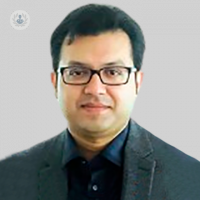Types of headache disorders
Written in association with:Headaches are a common ailment that can often cause discomfort and disruption to daily life.
Here, Dr Saeedur Rahman, renowned consultant stroke and internal medicine specialist based in Chatham, offers his expert insight into the types, evaluation, and treatment options of headache disorders.

What are the different types of headache disorders?
Headache disorders come in various forms:
- primary headache disorders
- secondary headaches
Almost 95% - 98% of headaches are due to primary headache disorders.
The most common types include:
- Tension headaches: Dull, persistent pain or pressure around the forehead.
- Migraines: Intense, throbbing pain often accompanied by nausea and sensitivity to light and sound.
- Cluster headaches: Severe, recurring headaches occurring in clusters over weeks or months.
Only a small proportion of patients suffering from a headache may have a secondary underlying cause for their symptoms.
When should I seek medical attention for a headache?
While occasional headaches are normal, certain signs indicate the need for medical attention i.e. secondary headache.
These signs include:
- Sudden and severe pain: Abrupt, intense headaches may signal an underlying medical issue that requires urgent evaluation.
- Worsening existing headaches: Medical consultation is advisable if headaches change in frequency, intensity, or symptoms.
- Persistent headaches: Headaches that last for an extended period warrant medical evaluation.
- Headaches with warning symptoms: A morning headache, a headache that worsens after bending or straining, a headache associated with blurred or double vision or any weakness or numbness in the face, arms or legs.
How are headache disorders evaluated and diagnosed?
Accurate evaluation and diagnosis is crucial for the effective management of headache disorders. The majority of the evaluation is based on good history taking and a thorough physical examination.
At times, it may require diagnostic approaches, which may include:
- Imaging studies: MRI or CT scans may be conducted to identify structural issues or abnormalities.
- Blood tests: Blood tests help rule out underlying conditions contributing to headaches.
- Lumbar puncture: In certain cases, a spinal tap may be performed to analyse cerebrospinal fluid in the brain and spinal cord.
How are headache disorders treated?
Treatment strategies vary based on the type and the severity of the headache.
Common treatment options include:
- Medications: From simple over-the-counter analgesics like Paracetamol and Ibuprofen to specific medications for migraines, both for acute attacks and for prevention. It is immensely important to note that overuse of analgesics or pain relief medications can cause an analgesic overuse headache. It is important to speak to a doctor if you are requiring pain relief medications 15 or more days in a month or if you have any of the worrying symptoms mentioned previously.
- Cognitive behavioural therapy (CBT): CBT can help to manage stress and modify behaviours contributing to headaches.
- Physical therapy: Neck and shoulder exercises, for example, can alleviate tension headaches.
- Biofeedback: Learning to control physiological responses to stress can help to reduce the frequency and intensity of headaches.
Are there any lifestyle changes that can reduce the frequency of headaches?
Several lifestyle adjustments can contribute to reducing the frequency of headaches.
These lifestyle changes include:
- Staying hydrated: Dehydration can trigger headaches.
- Eating a healthy diet: Eating a healthy diet that avoids specific foods like caffeine or processed foods which can trigger headaches.
- Having sleep hygiene: A good sleep routine increases wellbeing and helps prevent headache formation.
- Stress management: Stress can trigger or worsen various types of headaches. Stress management, involving activities such as mindfulness, yoga, and deep breathing exercises, can be beneficial.
- Engaging in regular physical exercise: Regular physical activity promotes good health and reduces tension.
If you experience a concerning headache, request an appointment with Dr Saeedur Rahman via his Top Doctors profile today to receive accurate diagnosis and personalised treatment.
If you have a headache which is sudden and severe in nature or a headache with face/arm/leg weakness or numbness- call 111.


